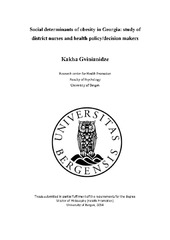| dc.description.abstract | Aim. Obesity and excessive weight have become one of the biggest problems in less economically developed countries, and among them in Georgia. A bio-medical explanation of this epidemic is quite restricted to give a room for planning effective interventions against it. The objective of this study was to identify social determinants of obesity in Georgia, to identify the primary social factors contributing to inequalities of spreading of overweight and obesity in different social groups. Methodology. The qualitative case study design was used in this research. For data collection, semi-structured, face-to- face interviews with the open-ended questions were conducted with 6 district nurses and physicians from the capital, Tbilisi, and the villages of Imereti region, as well as with 4 policy/decision-makers from the National Center for Diseases Control and Public Health. The theory of Social Determinates of Health developed by Dahlgren and Whitehead were used as a theoretical framework of this study. Mainly the Thematic Network Analysis guided the analysis of the data. Findings and discussion. The study has revealed the three main factors/global themes associated with spreading of obesity and excessive weight in different social groups: Transition, Active/Dominant Obesogenic" Stereotypes and Lack of Literacy, and Policy Against Obesity. Those three themes were developed based on a number of findings and organizational themes, namely: 1. Transition", united issues/organizational themes, such as Stability, Sustainability, Predictability, Length of being in status, Transition political and economic periods, Changing roles and traditions, Increased accessibility, Paradoxes of Georgia in education and SES, Waves of progression; 2. Active/dominant obesogenic' stereotype", based on the issues of Instinct of energy reservation, Care on weight, Low physical expenditure and overconsumption with increasing mobility, Obesogenic" traditions; 3. Lack of literacy and policy", including the themes such as Positive effects of western integration and globalization, Values and care of young generation, the Role of new education, Increasing trends of good examples, Increasing resistance, Changing perceptions on weight, health and beauty, Absence of policy and interventions against obesity. Conclusion and recommendations: The interplay of Transition, Obesogenic" Stereotypes and Lack of Literacy and Policy Against Obesity probably are main social determinants of spreading of obesity among Georgian population. Inequalities in spreading of obesity in different social groups are closely related to those factors. Obesogenesis needs to be understood as a complicated chain with the interplay between human agency and environment being in its core, rather than treating it as a mere outcome of influence of separate factors. Western integration, globalization and, curiously, increasing scales of the problem too play a positive role against obesity in Georgia by increasing literacy, shifting a focus from survival to health and beauty. It is highly recommended for the new policies against obesity in Georgia and countries of a similar context to be more of a catalyzing" nature of the existing positive processes correlated with weight control and development in the wider society, advanced introduction to the... | en_US |
